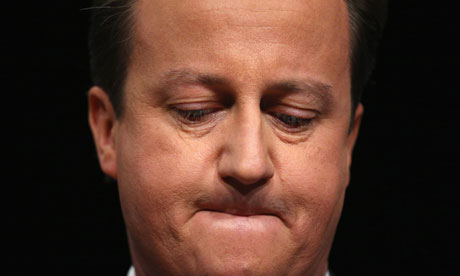
I always know something's wrong if someone makes a suggestion about the internet that I cannot only understand but understand well enough to object. I, whose understanding of said entity rests a bare half-notch above that of former Alaskan senator Ted Stevens, who famously characterised the internet as "not a truck. It's a series of tubes."
And so to David Cameron's speech about curbing online pornography, specifically child abuse images, the central plank of which seemed to call for search engines to stop certain "appalling" terms from returning results. I was reminded of one of the earliest jokes about the internet (back in the smog-ridden, soot-blackened days of 1998 when the first concerns began to stir that the greatest, most potentially transformative invention ever birthed by humanity just might be hijacked by people wanting to visit variations on the consensualornotwhogivesacrapifitgetsmeoff.com theme), the gist of which was that having filters for porn terms would be fine until you wanted to book a holiday in Scunthorpe.
Which is to say, banning words from search engines is a blunt tool that will raise more problems than it solves. A moment's further thought would also throw up the possibility that, much as we would like it to be otherwise, vile, depraved people providing and searching for vile, depraved things are not all thick and would probably come up with a new generation of more innocuous search terms and use them instead.
Another moment's thought might also yield the suspicion – and a moment of research could then substantiate it as fact – that if child abusers and rapists were using the same internet in the same way as us, they'd be a whole lot easier to catch. But it seems the devious bastards go undercover and use private servers, peer-to-peer networks and other tactics, so that while we all happily and openly use the cyber equivalent of the Royal Mail, "their" internet is effectively like the DX services solicitors use for inter-firm post, which ordinary punters barely ever see. I know. It's just not cricket, is it?
Even if all this were not the case – in fact, especially if this were not the case – there remains the problem of "calling for" something to be done. If you really believe something can and should be done, you don't call for it. You require it. You demand it. And if you are the prime minister of a country, say, you could force it by passing legislation – legislation, perhaps, that harnessed experts on the strange and shadowy cyberworld, how it works, and what lies hidden in its darkest corners.
But we don't have any of that. We don't have evidence that those or any other moments of thought went into Cameron's speech. His own actions betray him. If he really believed what he was saying, tough measures (and plentiful funding rather than cuts for the increasingly hard-pressed police and other workers on the frontline of the fight) would surely ensue. The finger-wagging prissiness we have instead suggests that he doesn't. It suggests we have Cameron making another shallow, opportunistic gesture to placate a populace he imagines to be as careless and uninformed about vital matters as he is. There comes a point when the standard amorality of his habitual behaviour becomes immorality. Pretending to be concerned about child abuse may just be it.

